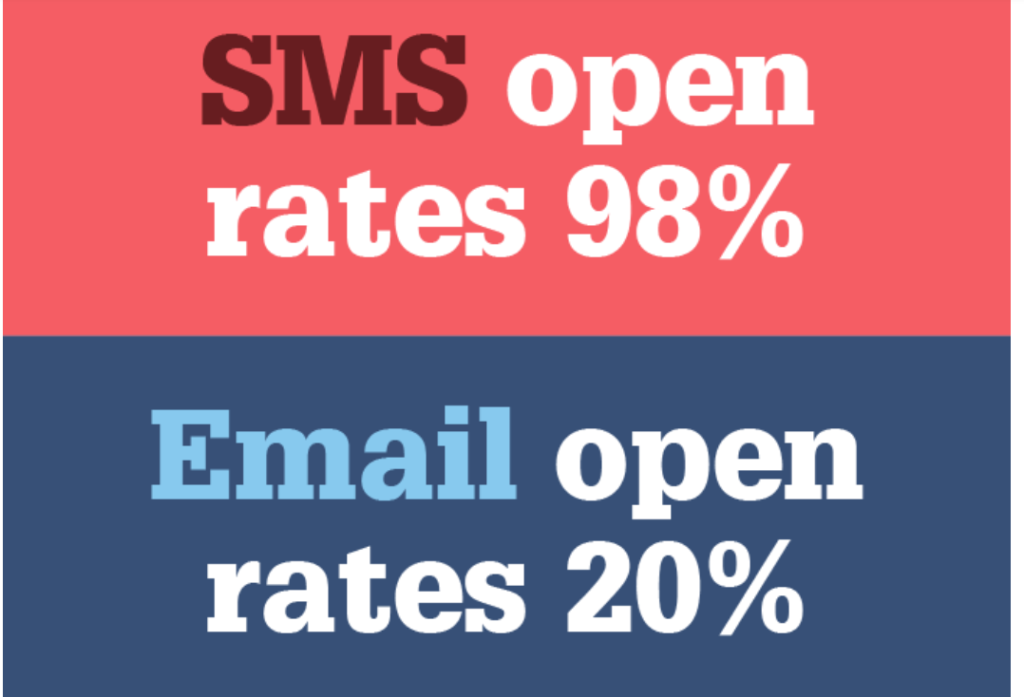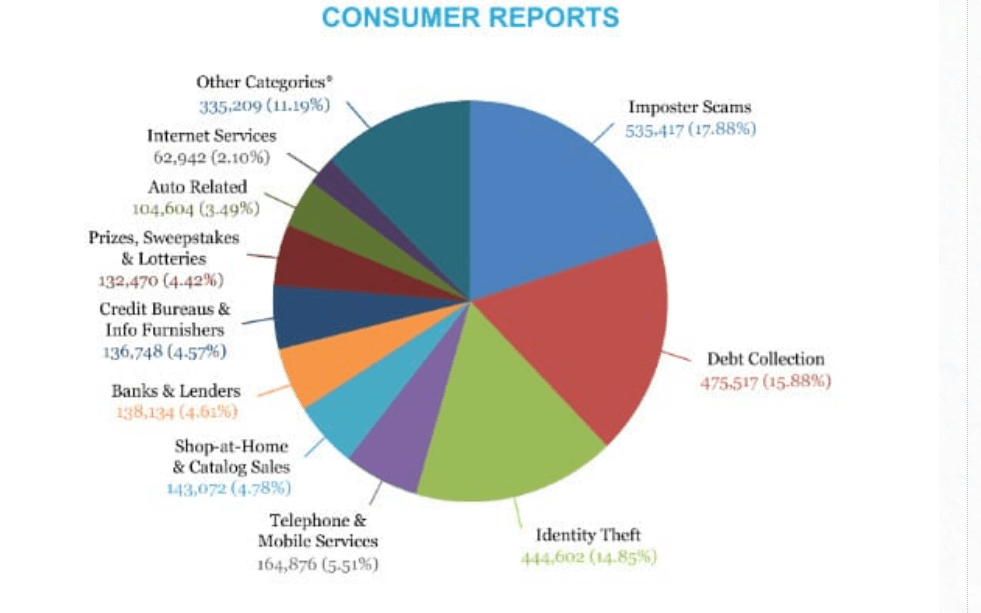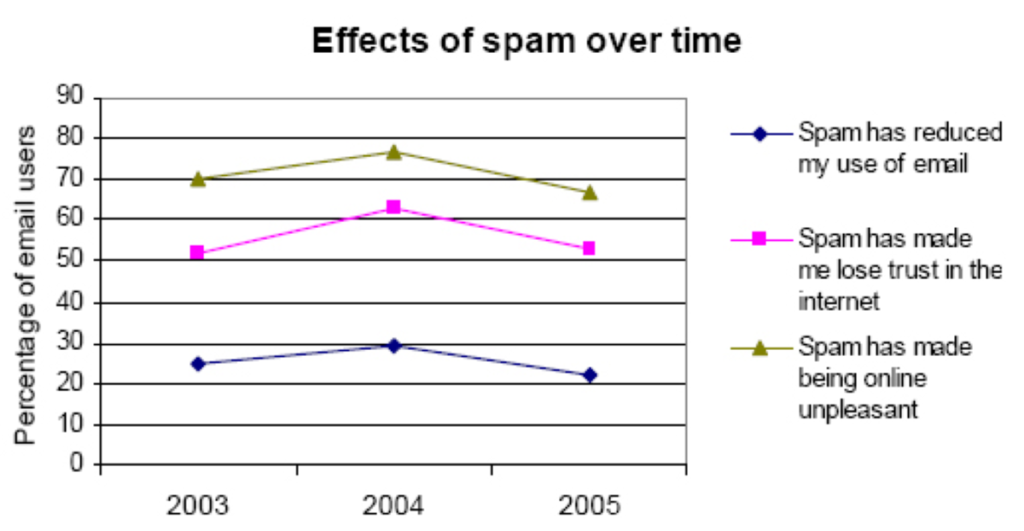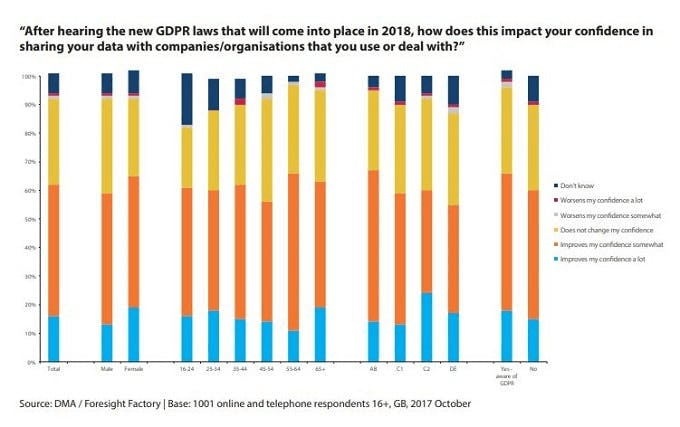[ad_1]
Cutting corners when it comes to text message marketing, otherwise known as SMS marketing, will come back to burn you in the end.
SMS marketing is a great way to reach your customers. In fact, 85% of consumers actually want to receive text messages from companies. So from the outside looking in, it seems like a simple way to boost open rates and increase sales—right?
Yes, SMS marketing will definitely do both of these things. But here’s the thing: You can’t just data mine your customers’ phone numbers and start blowing up their phones with text messages. If you take this route, you’re likely going to find yourself facing a significant number of fines.

Email is one of the marketing tactics that businesses most commonly rely on. However, with stats like this, why aren’t more companies taking advantage of SMS marketing? For one thing, rules and regulations might play a part. However, 98% open rates sure seem worth it. Image courtesy of Business 2 Community.
That’s why you need to have a very good understanding of the governing agencies and the regulations that are in place when it comes to SMS messaging. In this article, we’ll take a look at each entity and outline some best practices and tips for staying compliant while still reaching your customers.
RELATED ARTICLE: GET AHEAD WITH OLD SCHOOL MARKETING
Here’s a
quick look at the topics we’ll cover:
- The rule makers: who they are and
what they do - The rules: details on each
different regulation - Tips on how to follow these rules
The Rule Makers When It Comes to SMS Marketing
There are a
few different agencies that you should be familiar with when it comes to SMS
marketing rules. In this section, we’ll take a look at each and discuss in a
little more detail the role of each.
The Federal Communications Commission (FCC)
Let’s start with the bigwigs—the FCC. You’ve probably heard of this government agency before. This is because the FCC is the governing agency that regulates the communication industry, including radio, television, and phone communications. SMS messaging falls under the same regulations as telemarketing and auto-dialers, meaning it must follow the rules and regulations set by the FCC.
It’s
important you understand and are following the regulations set by the FCC. As a
governing organization, it can create and enforce laws. What that means is if
you do not follow the laws they have set, you’re liable to receive a fine or
have legal action taken against you.
Two of the regulations they have put into place that apply to your SMS marketing efforts include the Telephone Consumer Protection Act and CAN-SPAM Act. We’ll take a deeper dive into both of these regulations in the next section.
Cellular Telecommunications Industry Association (CTIA)
This association is not a governing body and does not have the same enforcement power as the FFC, but you’ll still want to know who they are. This is because the CTIA was created to represent and guide companies and individuals in the wireless communication industry.
The CTIA has developed a number of best practices that have become standards in the industry. In fact, their Messaging Principles and Best Practices document has become a useful resource for anyone in the SMS marketing world.
Here are a few topic areas that their best practices document covers in more detail.
- The use of shortcodes
- Understanding group messaging
- Toll-free phone numbers
- Unwanted messaging traffic
Mobile Marketing Association (MMA)
Last but not least, let’s talk about the MMA. The MMA is another organization that does not have the power to enforce laws but helps guide marketers with best practices. This organization is mainly made up of influencers in the mobile marketing world who are dedicated to advancing mobile marketing. Notably, their mission has the consumer in mind.
Now that
we’ve discussed the three main regulators and guiding agencies, let’s take a
look at the regulations and best practices you need to be following.
The Rules and Where SMS Messaging Fits
Let’s take
a look at the rules you need to follow and how they apply to SMS messaging. In
each section, we’ll discuss what the regulation or best practice entitles and
how you can develop your SMS marketing strategy to stay compliant with each.
The Telephone Consumer Protection Act
The Telephone Consumer Protection Act is one of those laws set by the FCC. Notably, this means you’re definitely going to want to follow the rules here. The overall gist of this act is that it restricts unsolicited telemarketing calls, faxes, pre-recorded calls, and SMS messages.

Many consumers know when they are being targeted or communicated with improperly according to the Telephone Consumer Protection Act. This chart gives you an idea of just how many different areas people can report about related to this regulation. Image courtesy of Hinch Newman.
There are a
few different areas that you need to address to stay compliant with this
regulation. Let’s take a quick look at the highlights.
- Prior expressed written consent: Basically, you must have written consent from your customers before sending any text messages to them. Also, during the consent process, you must make clear to consumers what they will be receiving from you. Finally, they must agree unambiguously to receive the content at the number they have provided.
- Prior express consent: This one applies to messages sent for non-commercial, informational purposes. It is reserved for communications from organizations such as non-profits, political communication, or other non-commercial outlets. Consent can be provided verbally for these types of messages.
- Auto opt-out: People must be able to easily opt-out of programs by responding to the messages they are receiving.
- Message content: Text messages sent must always clearly identify the sender of the message. Plus, they must provide the opt-out instructions mentioned above.
- Sending time restrictions: Messages can only be sent between 8 a.m. and 9 p.m. Notably, this is based on the local time of the message receiver.
By following these rules, you can ensure your SMS messages are staying compliant. As we look more closely at the other regulations, you’ll start to see they all have a common trend.
CAN-SPAM Act
The CAN-SPAM Act is generally associated with email. However, it applies to SMS messaging as well. This act adds layers to and enforces many of the requirements of the Telephone Consumer Protection Act. One detail in the CAN-SPAM Act to note is that it does not apply to messages communicating details from a previous transaction or relationship. For example, you can text a shipping update or delivery notification to your customer.
Here are the main requirements you need to know for this regulation:
- Emails must be easily identified as an advertisement
- There must be a simple subscribe and opt-out process
- Any opt-out requests must be honored
- Your message must provide clear subject lines and header information

This chart has a focus on the spam related to email, but it is an eye-opening stat. If we do not keep these numbers in mind when communicating with customers in the SMS marketing environment, it too could become an unpleasant place for consumers. Image courtesy of Pew Research Center.
You should follow these steps with both email and SMS marketing to stay compliant with the CAN-SPAM Act.
General Data Protection Regulation (GDPR)
If you’ve been in the marketing world in the last few years, you’ve definitely heard the acronym GDPR. This new regulation went into effect in 2018. During the time leading up to its launch, it had everyone buzzing—and for good reason.
This is because GDPR is unlike any regulation we’ve seen to date. Notably, it has strict guidelines and big consequences. It’s not specific to the US. However, if any company in the US does business with consumers in the European Union (EU), it does apply.
This new regulation is designed to help protect consumers and strengthen data security in all measures—not just email or SMS messaging. Its main goal is to improve data security by enforcing how companies are storing and transporting data. In all scenarios, consumers have to opt-in to sharing their data.

Prior to the launch of GDPR, many consumers felt more confident sharing their data with companies and organizations due to the new regulation. Image courtesy of EConsultancy.
GDPR is a very complicated regulation. All the same, here are a few of the many ways you can work to stay compliant with this regulation.
- Document and be transparent about
what data you are collecting from consumers - Clearly identify how and why you
are collecting this data - Disclose how you intend to use the
data - Clearly define your Privacy Notice
Last Minute Quick Tips for Staying Compliant with Your SMS Marketing
At this point, we’ve discussed a few of the most common regulations that apply to SMS marketing. If you’ve noticed throughout there are a number of different ways to stay compliant. However, many seem to overlap.
Therefore, we’re going to do a quick recap (and add a few extra) of the best practices you’ll want to follow to keep your communications compliant.
Best
practices for SMS marketing:
- Always provide an opt-in and
opt-out option for customers - Clearly identify your company when
sending messages - Never use misleading content in
headlines and subject lines - Let people know what types of
messages you will be sending and how many - Include the phrase “messages and
data rates apply” - Make sure your Privacy Policy is
readily available for consumers
Talk to Your Customers Directly with SMS Marketing
Now that you’ve had a crash course in SMS marketing regulations and how to stay compliant, it’s time to get out there and get your program started! However, if you’re still unsure how to navigate the confusing rules and regulations, you can partner with a digital marketing expert who can help make the process a little easier.
Finally, don’t let the fear of noncompliance keep you from expanding your marketing program. Remember, consumers are glued to their phones. So why wouldn’t you want to be talking to them directly?
[ad_2]
Source link
Leave a Reply